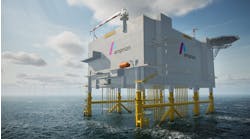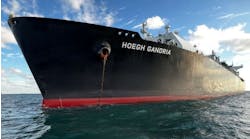Multi-discipline teams offer cost-effective riser delivery
Undivided responsibility is the key
Jeff Measamer, MCS
Multidiscipline riser delivery teams can improve delivery, reduce cost and uncertainty, and ensure delivery of safe, reliable riser systems.
Operators constantly seek to develop production more efficiently and effectively. Right now there is a shortage of experienced project personnel. When combined with the large number of projects that require staffing, a more systematic method of project execution is needed.
Projects increasingly are challenging for engineering. Recent Gulf of Mexico projects are in water depths exceeding 8,000 ft with production fluid temperatures of 240-250 °F and pressures of 12,000 to 15,000 psi. These conditions call for more stringent manufacturing requirements and the need for new qualification programs which must be understood by the delivery team.
MCS believes operators can respond to the challenges by developing a riser delivery management approach relying on teams of experts to deliver the hardware. The approach builds on MCS’ experience in riser design and analysis by bringing onboard highly experienced personnel with strong skills in the key additional areas of manufacturing, project management, welding and metallurgy, and quality management.
MCS developed riser design knowledge from its involvement in deepwater riser systems since its founding in 1983. Founded to provide analytical software for riser systems, MCS evolved into an engineering company with full riser design capabilities, expanding on its previous expertise in riser system analysis. MCS designed or verified design of riser systems on more than 90% of the floating production developments in the UK North Sea and some UK continental shelf projects.
Working with BP in the harsh environment west of Shetland since the early ’90s, MCS was involved with Foinaven and Schiehallion at the inception of each via a joint industry project to examine flexible pipework/riser integrity. The company continues to support BP’s Shetland operations by maintaining integrity management of the flexible riser and flowline systems. Another significant project was working with Shell on its pioneering application of flexible catenary risers during the Brent redevelopment, a first in the North Sea.
MCS also developed the first industry standard for the specification and design of flexible risers (API Spec 17J), and has had a long association with flexible pipe technology, building expertise working with operators and contractors as well as leading joint industry initiatives.
This experience allows MCS to design and analyze riser systems worldwide, including flexible, steel catenary, free standing, and top tensioned riser systems, including detailed design of the world’s deepest riser systems in more than 8,000 ft of water in the GoM.
Often managing delivery of hardware was separate from the design. No one group had “ownership” of the complete system. The design team finishes and moves to another project. The delivery team sees its job as delivery of parts as specified, often with little understanding of the interaction or engineering requirements for those parts. This means nobody has responsibility for overall design and delivery of a fully functional and safe system.
In this system, problems often are not recognized until late in the hardware delivery phase of a project. Issues may include operational safety or hardware interface problems, and often result in operational delays or cost overruns.
The ideal project execution team includes personnel with experience in design requirements, fabrication and manufacturing methods, quality control, quality assurance, and logistics. The team should understand the engineering requirements for the development in order to quickly resolve any manufacturing issues.
The initial phase of delivery management includes a thorough review of the design basis and supporting engineering documentation. This permits development of key hardware requirements to satisfy the design basis.
This process identifies precise requirements for manufacturing which may include areas such as heat treating and welding. In addition, component qualifications, which may require full scale testing, can be planned. Inspection procedures then can be implemented to allow early detection of manufacturing problems, so the project team can identify and resolve issues with minimal impact to the project.
With experience in the complete delivery process the riser delivery team also can identify potential delivery complications on long-lead items. For example, the required delivery dates for raw materials may be based on optimistic scheduling for items such as third party testing, or manufacturing processes such as machining or welding. Without a complete view of the delivery process, the project may seem to be on schedule when it actually will be delayed by processing steps not adequately accounted for.


